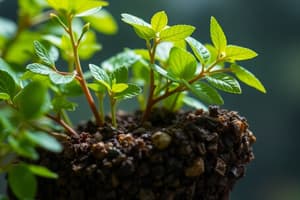Podcast
Questions and Answers
Unlike photosynthesis, cellular respiration occurs in?
Unlike photosynthesis, cellular respiration occurs in?
- All eukaryotic cells (correct)
- Only animal cells
- Only bacterial cells
- Only plant cells
The products of photosynthesis are the?
The products of photosynthesis are the?
- Products of cellular respiration
- Nutrients for plants
- Reactants of cellular respiration (correct)
- Sources of energy
What is the starting molecule for glycolysis?
What is the starting molecule for glycolysis?
Glucose
What are the reactants in the equation for cellular respiration?
What are the reactants in the equation for cellular respiration?
Which is the correct sequence of events in cellular respiration?
Which is the correct sequence of events in cellular respiration?
One cause of muscle soreness is?
One cause of muscle soreness is?
Photosynthesis is to chloroplasts as cellular respiration is to?
Photosynthesis is to chloroplasts as cellular respiration is to?
What are the two main types of fermentation called?
What are the two main types of fermentation called?
Which of the following is released during cellular respiration?
Which of the following is released during cellular respiration?
Breathing heavily after running is your body's way of?
Breathing heavily after running is your body's way of?
Glycolysis requires?
Glycolysis requires?
What is the energy of the electrons passing along the electron transport chain used to make?
What is the energy of the electrons passing along the electron transport chain used to make?
Cellular respiration releases energy by breaking down glucose in the presence of carbon dioxide.
Cellular respiration releases energy by breaking down glucose in the presence of carbon dioxide.
The products of glycolysis are 2 ATP, 2 NADH, and 2 pyruvic acid molecules.
The products of glycolysis are 2 ATP, 2 NADH, and 2 pyruvic acid molecules.
The energy needed to win a 2-minute footrace is produced mostly by?
The energy needed to win a 2-minute footrace is produced mostly by?
Which statement mainly explains why even well-conditioned athletes have to pace themselves for athletic hours?
Which statement mainly explains why even well-conditioned athletes have to pace themselves for athletic hours?
Cellular respiration is called an aerobic process because it requires?
Cellular respiration is called an aerobic process because it requires?
In eukaryotes, electron transport occurs in the?
In eukaryotes, electron transport occurs in the?
The Krebs cycle produces?
The Krebs cycle produces?
Which of these is a product of cellular respiration?
Which of these is a product of cellular respiration?
If you swim aerobically for 30 minutes, your body has probably started to break down stored molecules, such as fats, for energy.
If you swim aerobically for 30 minutes, your body has probably started to break down stored molecules, such as fats, for energy.
The conversion of pyruvic acid into lactic acid requires?
The conversion of pyruvic acid into lactic acid requires?
During photosynthesis, energy is stored in the form of fats.
During photosynthesis, energy is stored in the form of fats.
When the body needs to exercise for longer than 90 seconds, it generates ATP by carrying out?
When the body needs to exercise for longer than 90 seconds, it generates ATP by carrying out?
How are cellular respiration and photosynthesis almost opposite processes?
How are cellular respiration and photosynthesis almost opposite processes?
What are the reactants in the equation for cellular respiration?
What are the reactants in the equation for cellular respiration?
The Krebs cycle releases energy in the form of ATP.
The Krebs cycle releases energy in the form of ATP.
Either cellular respiration or fermentation can be used to release energy, depending on the presence of carbohydrates.
Either cellular respiration or fermentation can be used to release energy, depending on the presence of carbohydrates.
Which of the following acts as an electron carrier in cellular respiration?
Which of the following acts as an electron carrier in cellular respiration?
The starting molecule for glycolysis is?
The starting molecule for glycolysis is?
Without the Krebs cycle, the electron transport chain would produce very few ATPs.
Without the Krebs cycle, the electron transport chain would produce very few ATPs.
Milk is converted to yogurt under certain conditions when the microorganisms in the milk produce acid. Which of these processes would you expect to be in the key production of yogurt?
Milk is converted to yogurt under certain conditions when the microorganisms in the milk produce acid. Which of these processes would you expect to be in the key production of yogurt?
NADH and FADH2 carry electrons from the Krebs cycle to the electron transport chain.
NADH and FADH2 carry electrons from the Krebs cycle to the electron transport chain.
Which of the following is NOT a stage of cellular respiration?
Which of the following is NOT a stage of cellular respiration?
All of the following are sources of energy during exercise EXCEPT?
All of the following are sources of energy during exercise EXCEPT?
Glycolysis provides a cell with a net gain of?
Glycolysis provides a cell with a net gain of?
Cellular respiration releases energy by breaking down?
Cellular respiration releases energy by breaking down?
During lactic acid fermentation,?
During lactic acid fermentation,?
Which of the following passes high-energy electrons into the electron transport chain?
Which of the following passes high-energy electrons into the electron transport chain?
Each pair of high-energy electrons that move down the electron transport chain provided enough energy to?
Each pair of high-energy electrons that move down the electron transport chain provided enough energy to?
The first few seconds of intense exercise use up the cell's stores of fat.
The first few seconds of intense exercise use up the cell's stores of fat.
Which organism is NOT likely to carry out cellular respiration?
Which organism is NOT likely to carry out cellular respiration?
The electron transport chain can be found in?
The electron transport chain can be found in?
Which process is used to produce beer and wine?
Which process is used to produce beer and wine?
In prokaryotes, the electron transport chain is located in the inner membrane of the mitochondria.
In prokaryotes, the electron transport chain is located in the inner membrane of the mitochondria.
If an animal cell stops carrying out cellular respiration, it will die.
If an animal cell stops carrying out cellular respiration, it will die.
The Krebs cycle starts with?
The Krebs cycle starts with?
During the course of a long race, a person's muscle cells will use both cellular respiration and lactic acid fermentation to produce ATP.
During the course of a long race, a person's muscle cells will use both cellular respiration and lactic acid fermentation to produce ATP.
Cellular respiration uses one molecule of glucose to produce?
Cellular respiration uses one molecule of glucose to produce?
Lactic acid fermentation occurs in?
Lactic acid fermentation occurs in?
Which of the following is released during cellular respiration?
Which of the following is released during cellular respiration?
What is the correct equation for cellular respiration?
What is the correct equation for cellular respiration?
The starting molecule for the Krebs cycle is?
The starting molecule for the Krebs cycle is?
Which process does not release energy from glucose?
Which process does not release energy from glucose?
Which of the following is NOT a product of glycolysis?
Which of the following is NOT a product of glycolysis?
If you want to control your weight, how long should you exercise aerobically each time that you exercise?
If you want to control your weight, how long should you exercise aerobically each time that you exercise?
In the presence of oxygen, glycolysis is followed by?
In the presence of oxygen, glycolysis is followed by?
The reactants of photosynthesis are the same as the reactants of cellular respiration.
The reactants of photosynthesis are the same as the reactants of cellular respiration.
Which of these processes takes place in the cytoplasm of a cell?
Which of these processes takes place in the cytoplasm of a cell?
The Krebs cycle does not occur if?
The Krebs cycle does not occur if?
Plants cannot release energy from glucose using?
Plants cannot release energy from glucose using?
Flashcards are hidden until you start studying
Study Notes
Cellular Respiration Overview
- Cellular respiration occurs in all eukaryotic cells.
- Its equation includes glucose and oxygen as reactants, producing water, carbon dioxide, and energy.
- The overall process consists of glycolysis, the Krebs cycle, and the electron transport chain.
Glycolysis
- Glucose is the starting molecule for glycolysis.
- Requires an energy input and produces a net gain of 2 ATP molecules, 2 NADH, and 2 pyruvic acid molecules.
- Takes place in the cytoplasm of the cell.
Krebs Cycle
- Begins with pyruvic acid and releases carbon dioxide.
- Produces electron carriers NADH and FADH2.
- The Krebs cycle is necessary for the electron transport chain to produce a significant amount of ATP.
Electron Transport Chain
- Takes place in mitochondria in eukaryotes and in the inner membrane in prokaryotes.
- Utilizes energy from electrons (NADH and FADH2) to convert ADP into ATP.
- Produces energy by facilitating oxidative phosphorylation.
Fermentation
- Two types: alcoholic fermentation and lactic acid fermentation.
- Lactic acid fermentation occurs in muscle cells, regenerating NAD to allow glycolysis to continue.
- Alcoholic fermentation is utilized in the production of beer and wine.
Energy Production
- Cellular respiration produces a total of 36 ATP molecules from one glucose molecule.
- Muscle cells can switch between cellular respiration and lactic acid fermentation depending on oxygen availability.
- Intense, short-duration exercises utilize stored ATP quickly before switching to aerobic or anaerobic pathways.
Photosynthesis vs. Cellular Respiration
- Photosynthesis and cellular respiration are almost opposite processes: photosynthesis removes CO2, while cellular respiration releases it.
- Photosynthesis occurs in chloroplasts; cellular respiration occurs in mitochondria.
Important Processes
- Oxygen is necessary for aerobic respiration (hence the term "aerobic process").
- After intense exercise, heavy breathing repays an oxygen debt.
- Glycolysis does not release energy directly but enables pathways for aerobic respiration under aerobic conditions.
Key Misconceptions
- Cellular respiration does not involve the direct breakdown of glucose in the presence of carbon dioxide; rather, it involves breaking down food molecules.
- The Krebs cycle does not run if fermentation takes place, indicating anaerobic conditions.
Additional Facts
- NAD acts as an electron carrier in cellular respiration.
- The role of fats can increase significantly during extended aerobic activities, such as swimming for over 30 minutes.
- Both the Krebs cycle and the electron transport chain contribute to ATP synthesis, making them critical for efficient energy production.
Studying That Suits You
Use AI to generate personalized quizzes and flashcards to suit your learning preferences.




